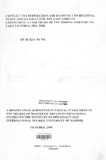| dc.contributor.author | Ruraa, Ruth | |
| dc.date.accessioned | 2013-05-08T10:43:26Z | |
| dc.date.available | 2013-05-08T10:43:26Z | |
| dc.date.issued | 2005-10 | |
| dc.identifier.uri | http://erepository.uonbi.ac.ke:8080/xmlui/handle/123456789/20269 | |
| dc.description.abstract | Quite a number of studies have been carried out in regard to Lake Victoria.
They range from the ecological aspects fishing, fish population
distribution, and water hyacinth menace - to other aspects such as the uses
(and perceived misuses) of the resources thereof. A number of these studies
have also explored the conflict in the lake, in relation to the riparian states.
However, since the re- integration of the East African countries to form the
East African Community (EAC), it becomes necessary to assess the conflict
afresh.
The objectives of this study are to: show how various background factors in
each member state contribute to conflict or co-operation in inter-state
relations in regard to Lake Victoria fishing industry; access the history and
the role of the EAC and its efforts in addressing the peace and security
issues with regard to Lake Victoria fisheries; and offer recommendations to
the EAC on the same.
What clearly emerges in this study is that there are a combination of factors
(read intervening variables) that explain the experiences and challenges
affecting maintenance of peace and security in the East African region.
Needless to emphasize, efficient and effective environmental management
and conservation occupy a central place in social, political and economic
interactions and development of the Lake Victoria basin.
To maximize the policy utilitarian value of this study, we have captured
important dynamics and explanations of peace and security, clearly
distinguishing them into three categories, so as to enable better
understanding of aspects and gaps towards achieving peace and security. An
analysis giving a variety of possible interventions by the EAC has been
offered. The study explores the gaps in the Community's efforts in nurturing
peace while proposing possible stopgaps. Against these initiatives, the study acknowledges the efforts of the
Community and its interests and offers possible recommendations and
conclusions based along the study hypotheses. It also points out to other
emerging threats to peace and security in the Lake Victoria basin. | en |
| dc.description.sponsorship | University of Nairobi | en |
| dc.language.iso | en | en |
| dc.subject | East African Community (EAC) | en |
| dc.subject | Regional peace | en |
| dc.subject | Security | en |
| dc.subject | Lake Victoria basin | en |
| dc.subject | Fishing industry | en |
| dc.title | Conflict in cooperation and its impact on regional peace and security for the East African Community | en |
| dc.title.alternative | A case study of the fishing industry on Lake Victoria, 1964- 2004 | en |
| dc.type | Thesis | en |
| local.publisher | Institute of Diplomacy & International Studies (IDIS) | en |

